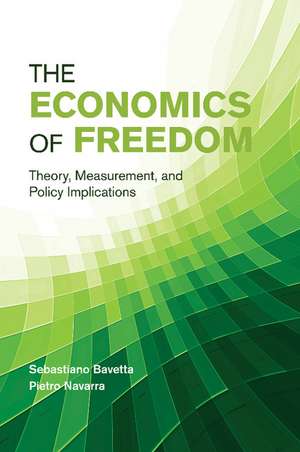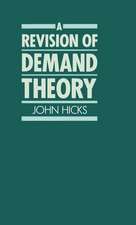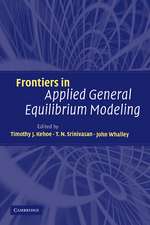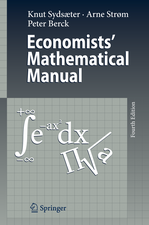The Economics of Freedom: Theory, Measurement, and Policy Implications
Autor Sebastiano Bavetta, Pietro Navarraen Limba Engleză Paperback – 4 mar 2015
| Toate formatele și edițiile | Preț | Express |
|---|---|---|
| Paperback (1) | 282.65 lei 6-8 săpt. | |
| Cambridge University Press – 4 mar 2015 | 282.65 lei 6-8 săpt. | |
| Hardback (1) | 721.46 lei 6-8 săpt. | |
| Cambridge University Press – 28 iun 2012 | 721.46 lei 6-8 săpt. |
Preț: 282.65 lei
Nou
Puncte Express: 424
Preț estimativ în valută:
54.09€ • 58.74$ • 45.44£
54.09€ • 58.74$ • 45.44£
Carte tipărită la comandă
Livrare economică 22 aprilie-06 mai
Preluare comenzi: 021 569.72.76
Specificații
ISBN-13: 9781107507241
ISBN-10: 1107507243
Pagini: 222
Ilustrații: 19 b/w illus. 29 tables
Dimensiuni: 152 x 229 x 13 mm
Greutate: 0.33 kg
Editura: Cambridge University Press
Colecția Cambridge University Press
Locul publicării:New York, United States
ISBN-10: 1107507243
Pagini: 222
Ilustrații: 19 b/w illus. 29 tables
Dimensiuni: 152 x 229 x 13 mm
Greutate: 0.33 kg
Editura: Cambridge University Press
Colecția Cambridge University Press
Locul publicării:New York, United States
Cuprins
1. Introduction; Part I. Concepts and Tools: 2. Choice and freedom; 3. Measuring autonomy freedom; 4. The empirical measure of autonomy; Part II. Autonomy Freedom and the Welfare State: 5. Why redistribute?; 6. Autonomy freedom and redistribution; 7. Autonomy freedom and welfare spending; 8. Conclusion.
Recenzii
'The Economics of Freedom is an interesting work of both philosophically inspired social science and empirically informed political philosophy. The authors construct a measure of autonomy freedom on the basis of data in the World Value Survey and compare how worldwide differences in attitudes correlate with social welfare policies. This book will intrigue researchers in comparative politics, welfare economics, political economy, and political philosophy.' Luc Bovens, London School of Economics
'At last theories of freedom meet with empirical evidence. Using a sophisticated social choice account of Millian autonomy, Bavetta and Navarra measure how free people feel they are comparatively across nations. A great achievement.' Keith Dowding, Australian National University
'This important work offers not only a masterful survey of the philosophical literature on liberty but also an important contribution to our understanding of the value of choice, the measurement of freedom, and implications of individual autonomy for the understanding and reform of social institutions. The authors' conception of 'autonomy freedom' is an imaginative and illuminating contribution to political theory and to the theory of freedom in particular.' Chandran Kukathas, London School of Economics
'Uniquely combining philosophical analysis, economic theory, and empirical research, The Economics of Freedom constitutes an important contribution to our understanding of the nature and value of freedom.' Martin van Hees, University of Groningen, The Netherlands
'At last theories of freedom meet with empirical evidence. Using a sophisticated social choice account of Millian autonomy, Bavetta and Navarra measure how free people feel they are comparatively across nations. A great achievement.' Keith Dowding, Australian National University
'This important work offers not only a masterful survey of the philosophical literature on liberty but also an important contribution to our understanding of the value of choice, the measurement of freedom, and implications of individual autonomy for the understanding and reform of social institutions. The authors' conception of 'autonomy freedom' is an imaginative and illuminating contribution to political theory and to the theory of freedom in particular.' Chandran Kukathas, London School of Economics
'Uniquely combining philosophical analysis, economic theory, and empirical research, The Economics of Freedom constitutes an important contribution to our understanding of the nature and value of freedom.' Martin van Hees, University of Groningen, The Netherlands
Notă biografică
Descriere
This book develops a measure of Autonomy Freedom and sheds light on its consequences for policy and political design.
















